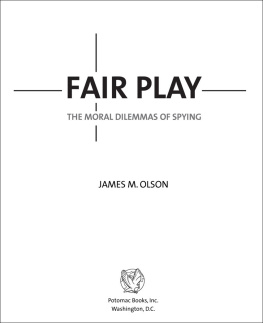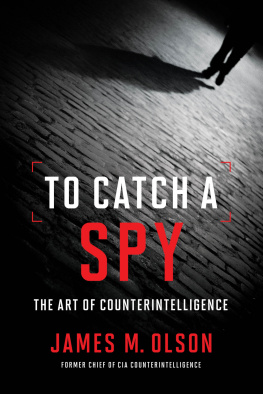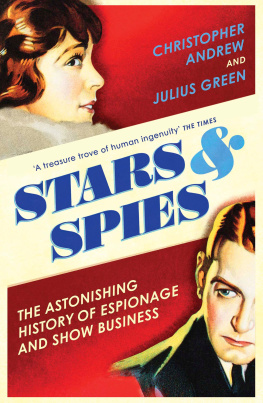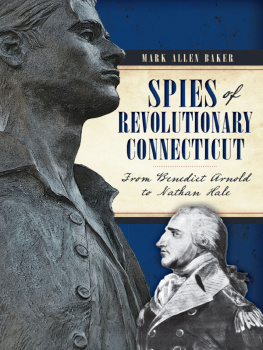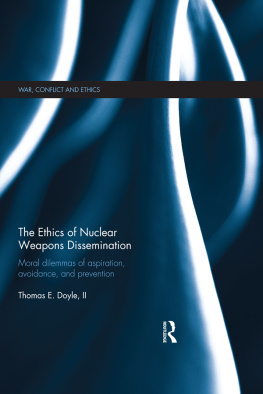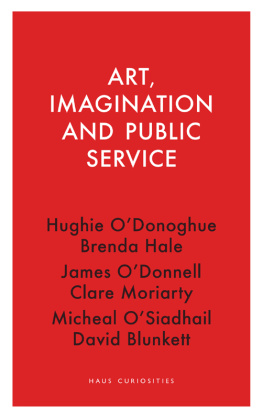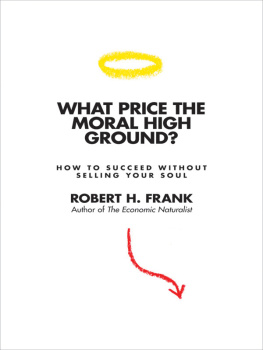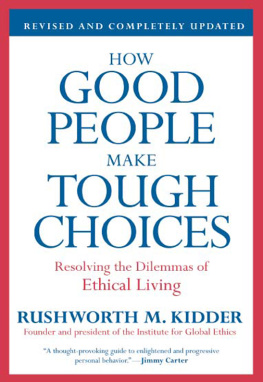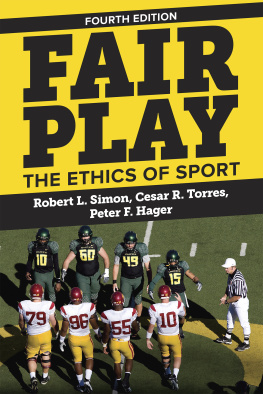FAIR PLAY
Other Intelligence Titles from Potomac Books
The Castro Obsession: U.S. Covert Operations Against Cuba,
19591965
by Don Bohning
CIA Inc: Espionage and the Craft of Business Intelligence
by F. W. Rustmann Jr.
Flawed Patriot: The Rise and Fall of CIA Legend Bill Harvey
by Bayard Stockton
Hide and Seek: Intelligence, Law Enforcement, and the Stalled
War on Terrorist Finance
by John A. Cassara
Silent Warfare: Understanding the World of Intelligence, Third Edition
by Abram N. Shulsky and Gary J. Schmitt
Spymaster: My Life in the CIA
by Ted Shackley with Richard A. Finney
Why Secret Intelligence Fails
by Michael A. Turner
FAIR PLAY
THE MORAL DILEMMAS OF SPYING
JAMES M. OLSON

Copyright 2006 Potomac Books, Inc.
Published in the United States by Potomac Books, Inc. All rights reserved. No part of this book may be reproduced in any manner whatsoever without written permission from the publisher, except in the case of brief quotations embodied in critical articles and reviews.
All statements of fact, opinion, or analysis expressed are those of the author and do not reflect the official positions or views of the CIA or any other U.S. Government agency. Nothing in the contents should be construed as asserting or implying U.S. government authentication of information or Agency endorsement of the authors views. This material has been reviewed by the CIA to prevent the disclosure of classified information. The views expressed by the commentators are likewise personal and do not reflect the views of their current or past employers.
Library of Congress Cataloging-in-Publication Data
Olson, James M., 1941
Fair play : the moral dilemmas of spying / James M. Olson.1st ed.
p. cm.
Includes bibliographical references and index.
ISBN 978-1-57488-949-9 (hardcover : alk. paper)
1. Intelligence serviceUnited States. 2. EspionageMoral and ethical aspects. 3. EspionageCase studies. 4. United States. Central Intelligence Agency. I. Title.
JK468.I6O47 2006
172.4dc22
2006012890
ISBN: 978-1-59797-153-9 (paperback : alk. paper) 10 9 8 7 6 5 4
Printed in the United States of America on acid-free paper that meets the American National Standards Institute Z39-48 Standard.
Potomac Books, Inc.
22841 Quicksilver Drive
Dulles, Virginia 20166
First Edition
10 9 8 7 6 5
To Meredith, Jeremy, Joshua, and Hillary
the best support team any spy ever had.
CONTENTS
PREFACE
The stereotype of spying is that it is a cold, hard, and dirty business where almost anything goes. As the protagonist in James Hiltons Random Harvest put it, The primary aim is to frustrate the enemys knavish tricks. Anything that does so is the thing to do, even if it seems a bit knavish itself. The United States has certainly been no stranger to knavery in its espionage and covert action operations around the world. However, U.S. intelligence does not and should not operate in a moral vacuum. As we will see in this book, U.S. attitudes toward spying have varied considerably over the years. In times of danger, Americans have been tolerant of more aggressive spying, even behavior many would consider dirty tricks. When the external threat has seemed less imminent, the moral standards have tightened. Some Americans have finessed the issue by taking the view that what happens in the shadows should stay in the shadows. Their directive to the U.S. intelligence community is, in effect, get the job done but dont tell us the details. That look-the-other-way attitude, I believe, is unhelpfuland not the way the United States should be doing business.
What constitutes acceptable moral behavior in any given operational situation has too often been left to the judgment of individual intelligence officers, their supervisors, or other senior officials. This has been a recipe for confusion, abuse, and cover-up. No profession, particularly one that can hide behind a veil of secrecy, should police itself. Attempts to codify what is morally permissible have generally failed because of the murkiness of the spy world and the shifting attitudes of U.S. government decision-makers and the public. What might have been considered morally unthinkable before the age of terror is now palatable to large numbers of Americans. Some U.S. politicians and editorial writers believe the intelligence community should be unleashed to fight the war on terror. Others believe unconstrained intelligence activity would undermine American values and make us no better than those we are fighting.
The current situation of no clear guidelines is unfair and unwise. Few U.S. politicians in either the legislative or the executive branches have been eager to put their name on laws or other documents that can in any way be perceived as stretching the moral limits. Members of the CIA, FBI, NSA, military, and other U.S. intelligence agencies are being told to penetrate terrorist cells and to prevent future attacks against Americans. If they do not do that, they will be held accountable and will suffer the consequencesmaybe even losing their jobs. But no one is willing to tell them the rules. Go do it, they are told, but if after the fact we decide you went too far, we will have your heads. This is not a formula that encourages risk-taking by intelligence practitioners, and the end result is that the overall effectiveness of the war on terror suffers.
U.S. intelligence is the servant of the American people. What it does in the United States and abroad it does in their name and on their behalf. In our open and democratic society, spies should not be making their own rules. The American people should have a voice in how U.S. intelligence operates and what the moral limits are. Ordinary citizens have no need to know the details of specific operations, sources, or methods, but they should have input on how our country conducts itself overseas and at home as it fights the war on terror. The first step, I believe, is for them to know what the world of intelligence is really like and what the moral issues intelligence professionals often face are. Thats my objective here. Public awareness must be raised before the country can have a well-informed, serious, and nonpartisan debate on the moral dilemmas of spying. I hope my book opens some eyes and causes some hard thinking.
ACKNOWLEDGMENTS
My first thanks go to the students of the Masters Program in International Affairs at the George Bush School of Government and Public Service at Texas A&M University in College Station, Texas. They were my sounding board in formulating and refining the moral issues associated with intelligence operations that eventually took shape in this book. Their comments in the classroom, in the corridors, in my office, and over lunch were invaluable to me in understanding how these future public servants, many of whom will one day be working in national security jobs, analyze these complex moral dilemmas.
I must also acknowledge the strong support and encouragement I received in writing this book from Dean Dick Chilcoat, Associate Dean for International Affairs Chuck Hermann, and all my colleagues on the faculty at the Bush School. I could not have asked for an environment that was more supportive or conducive to research and writing.
This book would not have been possible without the thoughtful input of many commentators from around the country. I used earlier associations in the intelligence community and elsewhere to prevail upon several of them; others, however, I knew only by reputation or were referred to by mutual acquaintances. In a few cases, not unexpectedly, I was turned down cold. Other people I approached for comments chose not to go on the record with their views on these controversial topics and graciously declined. Thats fine. For those who did respond, I wish to express my heartfelt appreciation.
Next page
